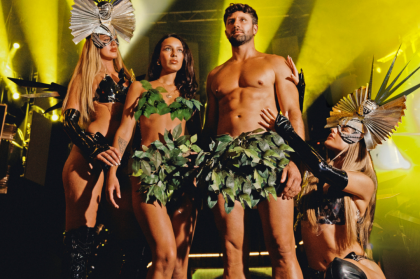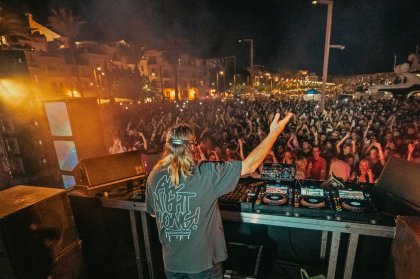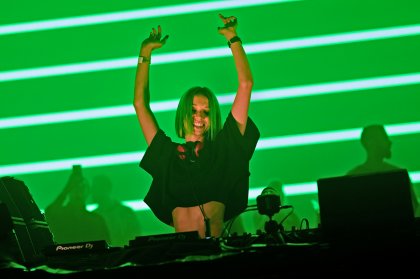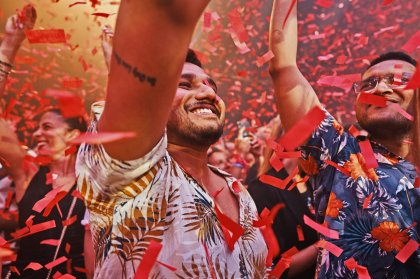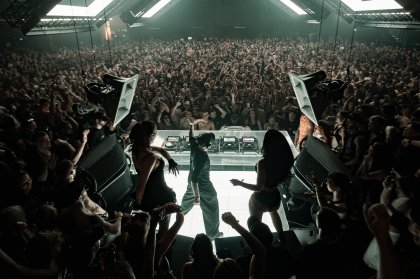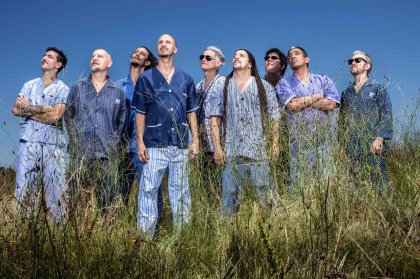
....should your mind wander to beats that go bump at night again the country boasts no shortage of iconic imagery, from industrial electronic cathedrals shrouded in photo-free mystery to walls of high-tech lights. Unjustly, but understandably considering its status as a nocturnal Mecca, the stereotypical buck stops in Berlin. That's despite other city-sized jewels in the Deutsche crown being worth their weight in amps.
Just ask Holger Behn, A.K.A. H.O.S.H., a guy who has proudly concentrated most of his efforts on Hamburg. From here he has built a reputation as one of Europe's broader musical faces, taking in dub, world sounds, and, of course, traditional club fare. Some of that went into his long-awaited debut album, Connecting the Dots, which dropped last winter, while the label he's synonymous with alongside Stimming, Solomun, and Adriano Trolio, Diynamic, celebrates five years of business in 2011.
Just don't call him a producer though, because Behn is a self-professed ‘DJ first and foremost'. It's a statement cemented with legendary sets at Ego, the notorious Grünanlage free outdoor parties attended by thousands, and achievements further from home, such as that Watergate residency, and dates at some of the planet's greatest venues.
Taking all that into consideration calling him at his home some 15km from the North Sea was always going to be interesting. When we did he expounded on the problem with those open-air events, what life might be like if he was a beautiful woman, and how he doesn't really differentiate between house and techno. Hold on; hear him out first…
Ibiza Spotlight: Hi Holger. So, how has summer been?
HOSH: “Good, yeah. Well, actually for me it has been nice but in Germany there hasn't been much of a real summer this year. Last year we had it pretty good, but not this time. I
have just got back from Brazil though, which was great, and got more summer out there, even though it's their winter.”
What were you doing in Brazil?
“We had a little tour there, as part of the five years of Diynamic stuff. So a couple of gigs with me, Solomun and Stimming all playing. It was exhausting, but we also had a lot of fun too.”
How did you find the scene there?
“It's really good. I mean it's more for people with money, and the prices are high- I was surprised about that. But we could play what we wanted, and people were really, really into their music. It
was really cool actually.”
And what has been going on at home?
“Well, the first open air party from Adriano and Stimming just went really well. That was last weekend, and was great. Also I have my own open-air parties around Hamburg, so we're getting ready for
the final one in September.
“We had real problems getting permission this time. It's been kind of a hard summer, purely just because the events got so popular. These are free parties, and too many people started turning up really, meaning it's harder to get permission now. At one we had over 10,000 people, which is way too much for anyone.
“We started with around 150… that was eight years ago and it has all just grown from there. Now we really have to think about how we can control it. Even people who don't normally listen to electronic music are coming to them, it's pretty crazy really.”
So is it becoming more difficult to run events in Germany overall?
“If you go the official way, with full permission and the law on your side, then it really depends on which party is running the scene right now. In Hamburg it changed and became a bit harder for
us as others came through, but in another couple of years it should be easier again.
“Overall though in Germany I'd say it's better than many countries as the authorities are OK with that kind of thing. We have been doing it for eight years and haven't had many problems. A few complaints of course, but we deal with the police in the right way.”
So how did the idea for these Grünanlage Festivals come about then?
“Well, we saw the concept in other cities and thought ‘why can't people in Hamburg just go out on a sunny summer day and dance?' It's a simple idea, but it still works really well. Of course the
other reason it began is because we all wanted to DJ at it!”
You're often quoted describing yourself as a ‘DJ first, producer second', why did you initially want to get studio savvy?
“I just started really because I was DJing and permanently bankrupting myself in record shops. So I stopped and got a normal job, met my girlfriend and was showing her my vinyl and stuff as a
hobby. She said to me ‘why are you not doing that- it's obviously where your heart is'. I thought ‘she's right'.
“After that she introduced me to an ex-boyfriend who still produced music, and I made two or three tracks with him, then a few more with another producer, until I thought ‘OK, I can do this on my own now'. In terms of my mindset I wasn't really thinking too much about what I would play or not, more just what was fun. Of course when I produce I always have a party in my head- I couldn't really do downbeat, well, maybe now I'm a bit older. But I always felt more inspired by clubs.”
And it's a lot harder to just be a DJ, right?
“For sure. Now it's almost impossible to build a name just as a DJ. And it's made a noticeable difference. When some producers are playing, mentioning no names, it's so different to a DJ. A really
good DJ, like in the older days, is hard to find now. People are concentrating more on production as a means to get noticed, and forgetting about the DJing side of things.
“But then it's really hard to do both. When I'm producing it's not easy to keep up with all the new releases and promos and stuff. The thing is though you need production to keep your name out there. I don't know, maybe if I was a beautiful girl who could DJ properly a label would ask me to simply present their records, not make them.”

Obviously your biggest production achievement to date was 2010's Connecting the Dots. 12 months on are you still happy with it?
“I still feel really comfortable with it actually, because I first started work on it as a little project for myself, not to try and fit in with any hype of the time. I didn't even want tracks to
stand out particularly, you know, like ‘this is the hit of the record' or whatever. When I listen to it now I think it could have been produced five years ago, or yesterday.
“It was a bit of a concept to do it that way I suppose. Maybe next time I'll go further down that route- take a theme and base the album on that or something, who knows. But yeah, I'm really satisfied with it. And, though it didn't sell huge numbers, plenty of people must have it because it was all over the internet!”
So why did it take four years at Diynamic before your first album?
“Well during the first years we were really just finding ourselves musically, with the Diynamic sound and stuff. Then like you say I have always felt more like a DJ, as I'm sure Solomun does too,
whereas Stimming is the classic producer. So, we all knew he had to be the first to release an album.
“Then we didn't plan who would do the next one but I had a bit on so couldn't find much time and wanted to create the album in one go, not make one track, then do something else, then go back to the album. In the end I took half a year off, and it was the right time for it actually.”
And you're in the studio at the moment?
“Yeah, I've had a lot on recently. I just did a remix for Audiojack, and one for a Russian act called Moonbeam. I also just got asked to do another, of a track featuring a vocalist called Lazarus
Man. Stimming did a record with him too, he's this South African guy with a very cool unique, spoken word style, everything he does is really emotional.
“On top of that I recently finished a couple of bootleg singles, and a new Diynamic EP is on the way. I'm not quite sure when that will be ready, it's quite open at the moment, and if there's no time in the schedule at Diynamic we will put it out on the new label, To Die For.”
How are things going with that? What's the difference between To Die For and Diynamic?
“Great, yeah. Well the difference is simple really. On To Do For there are no rules, it can literally be anything; hip-hop, house, disco. It doesn't matter at all, so long as the music is to die
for.”

Finally then, what else is coming up?
“Well I'm pretty excited as I have some dates lined up in Panama, and also Mexico where I've played before and always have a great time. I've never been to Panama though and my brother is out there
right now so I'm going to tie it in with a vacation for a week or two.
“The locations sound amazing, apparently they are all in ruins, with walls but no ceilings or roofs. I saw some pictures and they look pretty special. My brother has told me the scene out there is
very small, but it's getting bigger like everywhere in North, Central and Latin America seems to be. I'm also heading out to Australia in early 2012 to
do a tour. I've been before and the people are so into the music, it's really different from Europe.
“It's fresher out there, everything is so new. In Europe people have been partying for a decade or two, though now there seems to be a new generation coming through which is a good thing. Techno or house, I personally don't see much difference, in Germany at least, seems to be getting more attention again, and we have a lot of 18-22 year olds coming to our parties, dressing wild and stuff. A while ago it seemed like everyone was getting a bit stuck, so things are looking up right now.”
